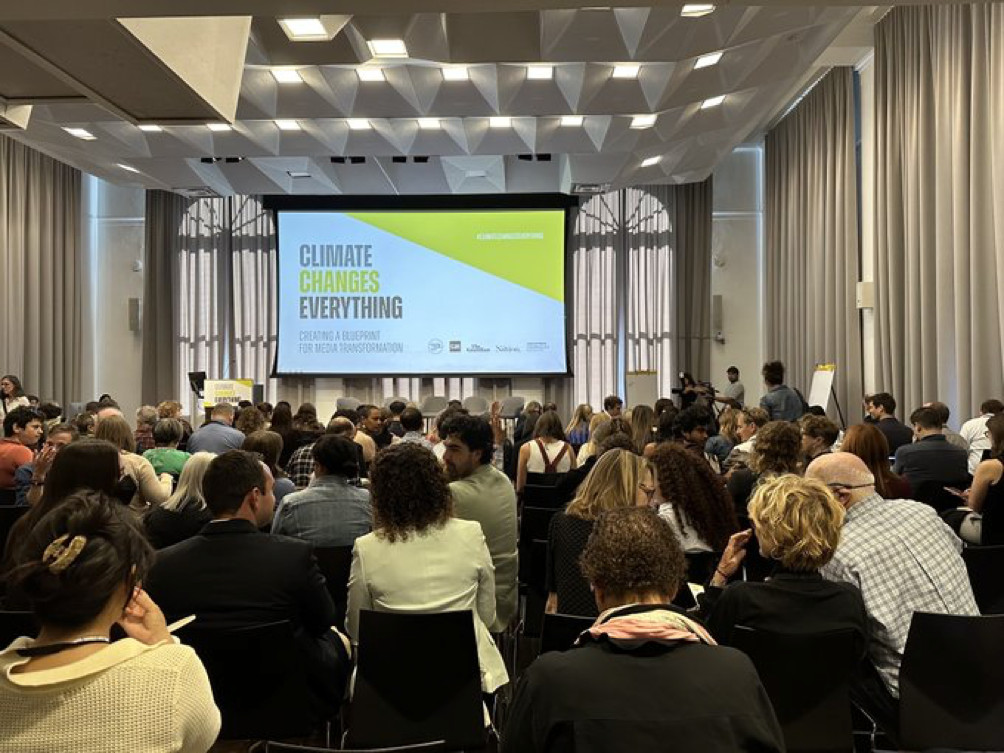Sign up for the daily CJR newsletter.
How can climate journalists around the country work together? How can they make justice the center of their stories? Is it possible to convey a sense of optimism in climate journalism?
Hundreds of journalists, editors, and media managers from around the globe gathered at the Columbia Journalism School this week to discuss ways to transform how the world’s press covers climate. The conference, called “Climate Changes Everything,” was sponsored by Covering Climate Now, along with CJR, The Guardian, The Nation, and the Solutions Journalism Network. It began on Thursday, September 21, and continues on Friday.
“The narrative we set in people’s understanding will substantially determine if we are able to address climate change,” said Christiana Figueres, the former executive secretary of UNFCC and architect of the 2015 Paris Agreement. “The way you report will have an impact on the lives of people for seven generations.”
That sense of urgency and intention was the undercurrent of the day’s conversation. The conference sought solutions and best practices to ensure the climate crisis is being effectively and fairly covered by global media. Mark Hertsgaard, the cofounder and executive director of Covering Climate Now, told the audience that covering an emergency is “not activism or advocacy; it is science.”
Figueres, in an interview with Zinhle Essamuah, an anchor from NBC News, said she was once hopeful that fossil fuel companies could participate in climate agreements, but now felt she was wrong about that industry’s involvement. She said that it is now inconceivable to her that the organizations which are substantially responsible for climate change were not aware of its effects. She later added that they should not be included in COP28 if they are only there to be obstreperous.
After expressing gratitude for the increased volume and granularity of climate change coverage, Figueres said that the media could do a better job helping the public understand that addressing the climate crisis is everyone’s responsibility. While she said that may have been a burden in the past, growing access to and lowered costs of renewable energy technology have changed the calculus. In this way, she felt her home country of Costa Rica, whose energy output is 99 percent supplied by renewable energy, could be an inspiration to the Global North.
To ensure that climate justice stayed at the forefront of media coverage, Lagipoiva Cherelle Jackson, the global climate collaborations editor for the Associated Press, invited small and large newsrooms from all over the world to partner with the AP to tell stories that are meaningful and reflective of Global South and minority perspectives. Through those partnerships, the AP’s platform could help amplify voices that might not otherwise be heard. Omaya Sosa Pascual, the cofounder of Puerto Rico’s Center for Investigative Journalism, also sought to amplify local knowledge and voices but called out parachute journalism for not hiring local reporters, especially when reporting disaster stories. She also suggested that, while “it is not sexy to hold your own government accountable for what they are doing to smaller, poorer nations,” journalists in the Global North should still make sure to do so. “It is a global story,” Pascual said. “People are dying.”
This level of self-accountability was later mirrored in a panel that returned to the topic of fossil fuel advertising moderated by Rachel White, the executive vice president of philanthropy and business development for The Guardian. In conversation with Melissa Bell, the publisher and cofounder of Vox Media, and Amy Westervelt, the founder of Critical Frequency, the three made clear that accepting revenue from that sector—despite its deep pockets—was more damaging than the dollars are worth. The Guardian stopped accepting ad revenue from any extraction-based business in 2020, and Vox Media stopped a year later. Taking the idea one step further, Westervelt warned against accepting philanthropic money without serious due diligence.
On Friday, the event continues with working group discussions, a panel on climate change and the 2024 elections, and a conversation with the White House national climate adviser, Ali Zaidi.
Has America ever needed a media defender more than now? Help us by joining CJR today.









